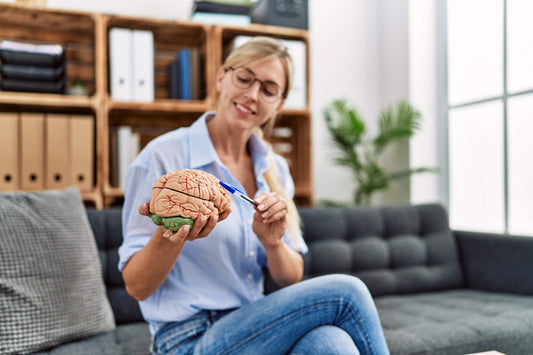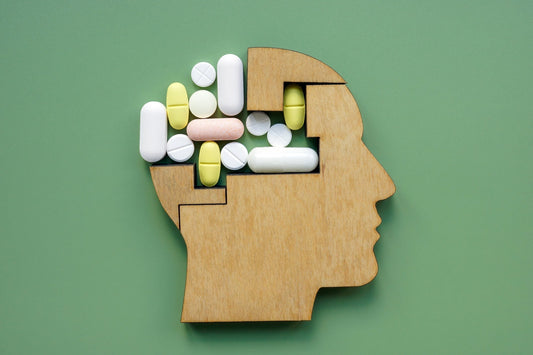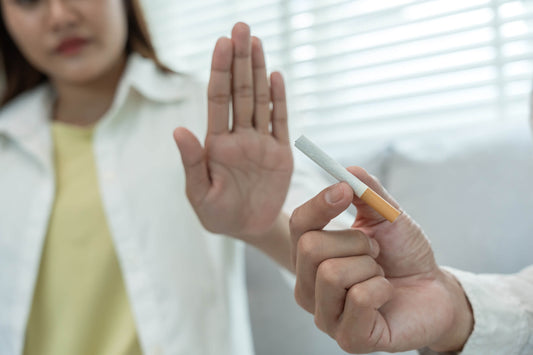When life feels heavy, even the simplest tasks can seem impossible. You may feel like, no matter what you do, you can’t find relief from the weight of the world on your shoulders. That weight doesn’t have to stay on your shoulders alone.
You can share the burden with trusted loved ones and get professional help. If you’re looking for quick relief, there are many effective strategies you can try right now. The best depression and anxiety treatment starts with what you choose to do every day.
In Amen University's 6 Weeks to Overcome Anxiety, Depression, Trauma, and Grief Course, Dr. Daniel Amen and Tana Amen provide powerful strategies to help manage mental health challenges. There are natural anxiety treatments and holistic ways to overcome depression and heal trauma with effective science-backed methods that make a real difference in how you feel every day.
Here are six techniques you can use to find calm and clarity when you need it most and feel better fast.
6 Fast-Acting Mental Health Strategies
1. Bilateral Stimulation
When life feels frantic, your brain actually has the power to ease the chaos. You just need to know what tools to use to help calm your mind. Bilateral stimulation (BLS) can help link past traumatic memories to a sense of calm rather than triggering feelings of distress.
The techniques help synchronize the brain’s hemispheres, bringing balance to your emotional response and helping you cope with stress. The concept is simple: move your body in ways that activate both sides of your brain while focusing on soothing thoughts. Here are a few ways to use these techniques in overcoming trauma:
· Visual: Move your eyes back and forth from left to right while thinking about a stressful situation and visualize a positive outcome. This is a key aspect of a proven form of psychotherapy called eye movement desensitization and reprocessing (EMDR) that is beneficial for trauma-related symptoms.
· Tactile: Gently stroke your arms up and down, making an ‘X’ across your chest and imagine your worries melting away with each motion. This form of BLS is called havening.
· Auditory: Rub your hands together slowly as you focus on comforting words or affirmations like, “I am calm and in control.”
These simple actions might feel unusual at first, but they can be powerful for achieving relaxation and balance at a moment's notice. Studies on EMDR have shown that bilateral stimulation reduces symptoms of anxiety and trauma when paired with BLS. You can also help loved ones use these grounding exercises to ease depression from grief and improve mental health.
2. Diaphragmatic Breathing
One of the most natural anxiety treatments to lower stress levels is to reconnect with your breath. Babies naturally breathe with their bellies but, as adults, many of us switch to shallow chest breathing.
Ironically, this can increase anxiety because doing so can activate your fight-or-flight response. You can try this diaphragmatic breathing technique to restore your breathing to a more calming and natural rhythm:
- Inhale through your nose for a count of four.
- Hold for one second.
- Exhale slowly for eight seconds through your mouth.
Controlled breathing techniques are proven to stimulate the body’s relaxation response, calming the nervous system to help with anxiety and depression.
A study by Harvard University found that breathing exercises can lower blood pressure, reduce stress, and activate the body’s parasympathetic response. This is essential in overcoming trauma and finding mental peace when times are tough.
You’ll see the best results if you become more mindful of how deeply and intentionally you breathe throughout your day.
3. Hand Warming for Relaxation
The nerves in our hands play a surprisingly powerful role in managing stress. Hand warming is a gentle, soothing practice that engages your sympathetic nervous system.
Think about the times you’ve felt safe and cozy. How often do they include some relaxing form of physical warmth? There’s a reason this has been used to improve anxiety treatments and post-traumatic stress disorder (PTSD). You can try to control feelings of panic or depression with these methods:
- Submerge your hands in warm water for a few minutes.
- Visualize warm and comforting imagery, like a loved one holding your hands.
- Get a relaxing hand massage with warming essential oils.
Some research has found that heating therapy can be an effective way to reduce depression. One of the first steps you can take to overcome depression is to start with sensory foraging, the act of mindfully engaging the senses as with hand warming, to promote inner peace and connection within yourself.
4. Surround Yourself with Soothing Scents
Aromatherapy is more than just a trend; it’s backed by science as an effective natural anxiety treatment. The sense of smell is closely linked to the brain's limbic system, which plays a role in mood and memory. Here are a few scents with scientifically proven benefits:
- Lavender: Can be used to reduce anxiety, improve mood, and as a promising mild depression treatment.
- Chamomile: The calming effects of drinking the tea and wearing the essential oil can have a mild sedative effect on anxiety.
- Rose: The analgesic properties are helpful to ease emotional pain and a great support for those dealing with grief.
- Lemon: This essential oil can uplift your mood and boost mental clarity for a natural depression treatment as part of a comprehensive mental health depression plan.
- Eucalyptus: Can improve blood circulation to the brain and help reduce pain and inflammation in stress-induced ailments such as rheumatoid arthritis.
- Peppermint: Known for its refreshing and invigorating scent, this scent can alleviate tension, improve cognitive function, and overcome mental fatigue.
Many studies support essential oils as complementary tools to your natural anxiety and depression treatment. For a quick mood lift, you can diffuse essential oils in your room or keep a small bottle of your favorite scent with a carrier oil to inhale and apply throughout the day.
5. Create a Positive Go-To Playlist
Crafting a playlist of uplifting, comforting, or calming songs can be an instant mood booster. Music engages multiple brain networks, including the auditory cortex, emotion-processing areas, memory centers, and the motor system.
Research indicates that music therapy can be a great supplement to reducing symptoms of depression from grief, substance abuse, neurodegenerative conditions and more.
Consider creating a playlist with a variety of songs you enjoy—just make sure they’re uplifting, inspiring, or calming. Whether it’s classical music to soothe stress, upbeat songs to energize you, or an ambient mix to help quiet your mind, music has the power to improve your mental state and overcome depression.
6. Hypnosis for Mental Clarity and Calm
Hypnosis might sound unconventional, but it’s an increasingly popular and scientifically supported approach to overcoming trauma, anxiety, and stress. Hypnosis can help you reprogram your mind, visualize success more easily, feel more confident, and release painful stress.
Listening to a guided hypnosis audio during bedtime or taking a few minutes during the day to practice self-hypnosis can significantly calm the mind and aid focus.
In their online anxiety and depression course, Dr. Amen and Tana share how hypnotherapy techniques help sharpen focus through visualization and use positive affirmations to ease anxiety and overcome trauma. One study found that hypnotherapy can be as effective as cognitive behavioral therapy for depression help and anxiety treatment.
The Path to Natural Healing and Happiness
Finding natural ways to manage anxiety, overcome depression, heal trauma, and process grief can lead to profound lasting changes in your mental health. Sign up for Dr. Daniel Amen and Tana Amen’s 6 Weeks to Overcome Anxiety, Depression, Trauma, and Grief Course to get scientifically proven methods to enhance your emotional well-being.

 Amen University
Amen University








